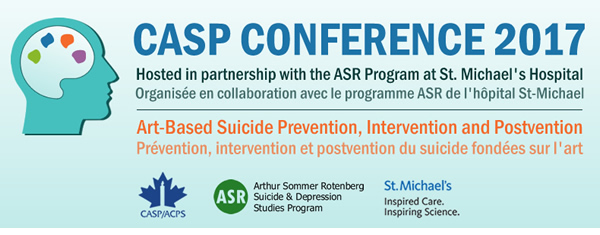
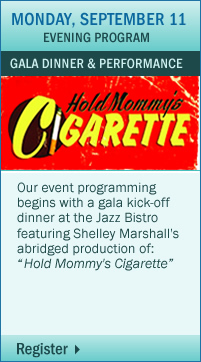
|
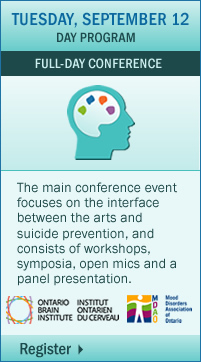
|
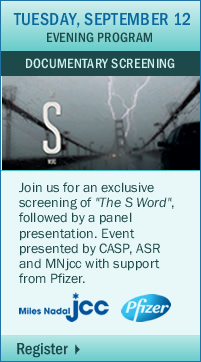
|
Now introducing our opening panel:
 |
Dr. Ronald R. Holden came to Queen’s University in 1984 as an Assistant Professor and an Ontario Ministry of Health Career Scientist. He is currently a Full Professor in the Department of Psychology. Ron has served as the Acting Head of the Department of Psychology and as the Psychology Department’s Graduate Studies Coordinator.
The De-Psychiatrization of Suicide: Moving to a More Psycho-Social Model of Suicide |

|
Janet Parsons, PhD, is a research scientist at the Li Ka Shing Knowledge Institute and the Applied Health Research Centre at St. Michael’s Hospital, as well as Assistant Professor in the Department of Physical Therapy and the Rehabilitation Sciences Institute, University of Toronto. As a qualitative and arts-based methodologist, she specializes in the development and application of visual and narrative methods to a wide range of health research topics, with a focus on health equity. She has used photography, film, drawing and storytelling in her research.
As a qualitative researcher specializing in the application and development of arts-based methods, I am interested in the ways in which these approaches generate new knowledge and promote greater understanding regarding a variety of health topics. These methods engage us not only in the midst of the research process, but also have important roles to play in the sharing of research findings. What kind of ‘work’ do the products of arts-based research projects do? What does ‘impact’ look like? I will argue that both research and interventions that incorporate the arts are intimately connected, and I will share some key learnings from projects that I have collaborated on locally, nationally and internationally. |
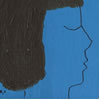
|
Linda Monteith Gardiner is a photographer and filmmaker who lives with schizoaffective disorder. She has also authored a graphic novel on her experiences with psychosis entitled ‘Me, At Home With the Cameras’.
Linda Monteith Gardiner will outline the circumstances leading to her decision to end her life in October of 2009 and how a chance conversation resulted in her referral to the Creative Works Studio, an arts-based program for people with mental illness and addiction. She will then describe how art, a totally new endeavour for her, affected her strongly held suicidal ideation and how this ultimately led to a positive outcome. She will further discuss how she is now fully involved in the arts as a photographer and filmmaker and how this allows her to keep the suicidality at bay. |
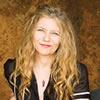
|
Isabel Fryszberg has been providing innovative and creative programming in mental health for over 2 decades. She is a multidisciplinary artist (filmmaker, musician and visual artist) and Occupational Therapist. She has a cross status appointment at the University of Toronto in the Department of Occupational Science and Therapy and in the Arts and Humanities Inter Professional Education. Isabel was founder and former Creative Lead of Creative Works Studio (CWS), which was an arts-based occupational therapy program of St. Michael’s Hospital in partnership with the Good Shepherd Non Profit Homes in Toronto.
Isabel Fryszberg will discuss the healing property of arts in intervention based on her 20 years of experience working in an arts-based occupational studio that she pioneered. She will demonstrate how new creative occupations and identities evolve when working in a real art studio space and place that provides and supports new identities and roles other than sickness. She will give examples of how new purpose coming from real art based projects such as making a film together, preparing an art exhibit, or recording a music album based on original songs written collaboratively as a songwriting group can be a rejuvenating elixir for providing new hope. It is in this space of of art-making where a new culture of health evolves to overcome lost identity and hopelessness. She will share a clip from their knowledge based documentary film, What’s Art Got To Do With It? that brings you inside this community, as well share an original song from a music track from a band called the Social Mystics that she spear headed that also evolved from the same community. She will also highlight some of the real evocative life affirming statements and quotes from some of the artist/members she had worked with who had been living with experiences of suicidality and how this new culture of art making had changed their lives. |

|
Nancy Moreau Battaglia, MBA, D.TATI, FT, RP is a Registered Psychotherapist, Professional Art Therapist and holds her Fellowship in Thanatology (The Study of Death, Dying and Bereavement (ADEC)). While supporting those with a wide range of mental health struggles, Nancy specializes in working with individuals and families who are bereaved due to sudden traumatic death. She is a 2 time survivor of Suicide loss and is active in Suicide Postvention speaking to educate clinicians, survivors and those supporting them. She is a member of the Board of Directors of the Canadian Association for Suicide Prevention, a planning committee member for the Simcoe County Suicide Awareness Conference, and Secretary for the ADEC Credentialing Council.
‘Conversations’ in the midst of chaos. |
|
Register for some or all of these events at caspconference2017.eventbrite.com Save on registration costs with our early bird rate, available until August 31st! For more information about the conference, please visit caspconference.ca or contact: Yvonne Bergmans ([email protected]) or Julie K Campbell ([email protected]) Looking forward to seeing you in Toronto September 11 and 12! |


